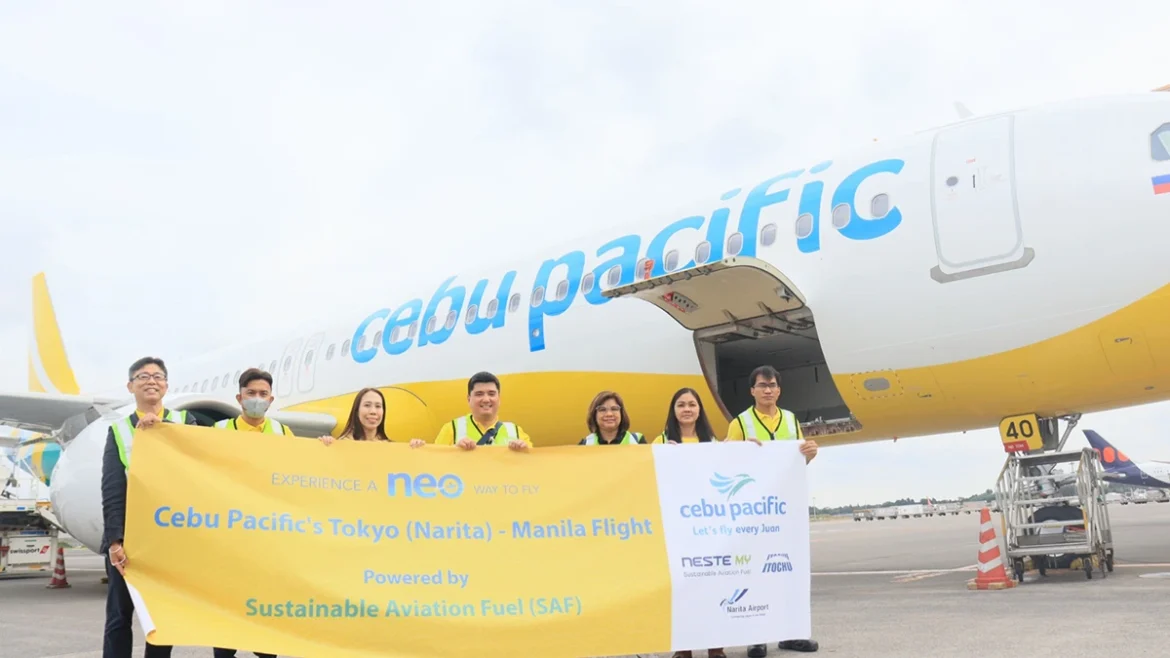Cebu Pacific, the Philippines’ leading airline, has achieved a remarkable milestone in sustainable aviation by successfully completing Flight 5J 5055 from Narita to Manila using sustainable aviation fuel (SAF).
This achievement not only contributes to environmentally responsible air travel but also aligns with the vision of the COP28 summit, scheduled to be held in the UAE in November.
Cebu Pacific flight from Narita to Manila
Utilizing an Airbus 321neo and a 40% blended SAF provided by Neste Corporation and distributed by Itochu Corporation, Cebu Pacific has managed to reduce carbon emissions per passenger by an impressive 44%. This feat makes Cebu Pacific the first Philippine carrier to employ SAF in a commercial flight departing from Japan.
Alexander Lao, President and Chief Commercial Officer at Cebu Pacific, emphasized the airline’s ongoing commitment to sustainability. He stated, “While we await a sufficient SAF supply to meet the aviation industry’s demands, this inaugural Narita to Manila SAF flight symbolizes Cebu Pacific’s dedication to making air travel more sustainable.
“Our other decarbonization efforts include investing in fuel-efficient NEOs, optimizing flight plans, and adopting fuel efficiency best practices to minimize fuel consumption. These concrete sustainability initiatives underscore our support for the aviation industry’s goal of achieving net-zero emissions by 2050.”
Distribution of sustainable aviation fuel
The collaboration between Cebu Pacific, Neste Corporation, and Itochu Corporation has garnered attention and praise.
Itochu, the branded distributor of SAF in Japan, expressed its enthusiasm for the partnership. Atsushi Onishi, Senior Officer of Itochu’s Energy Division, said, “We are excited to partner with Cebu Pacific in our collective pursuit of sustainable aviation. Our collaboration highlights the growing demand for SAF in the Asia-Pacific region, and we are prepared to meet that demand.”
Special in-flight activities
Passengers on this historic flight not only became a part of history but also received commemorative tokens and engaged in special in-flight activities. Narita International Airport welcomed this initiative with enthusiasm. Toshio Tashiro, Executive Officer of Narita International Airport, commended Cebu Pacific’s commitment to sustainability, saying, “We are honored that Cebu Pacific chose Narita International Airport for this initiative. As one of the select airlines operating SAF flights in Japan, Cebu Pacific’s dedication to sustainability is praiseworthy.”
In a stakeholder event held in Dubai earlier this year, Cebu Pacific reiterated its 2022 Sustainability Report, reinforcing the airline’s commitment to decarbonization, especially through its fleet modernization program.
The airline aims to reduce CO2 emissions per passenger by transitioning to an all-New Engine Option (NEO) fleet by 2028. Cebu Pacific has also reaffirmed its commitment to a sustainable future by pledging to use blended SAF throughout its entire commercial network by 2030.
tanvir@dubainewsweek.com

